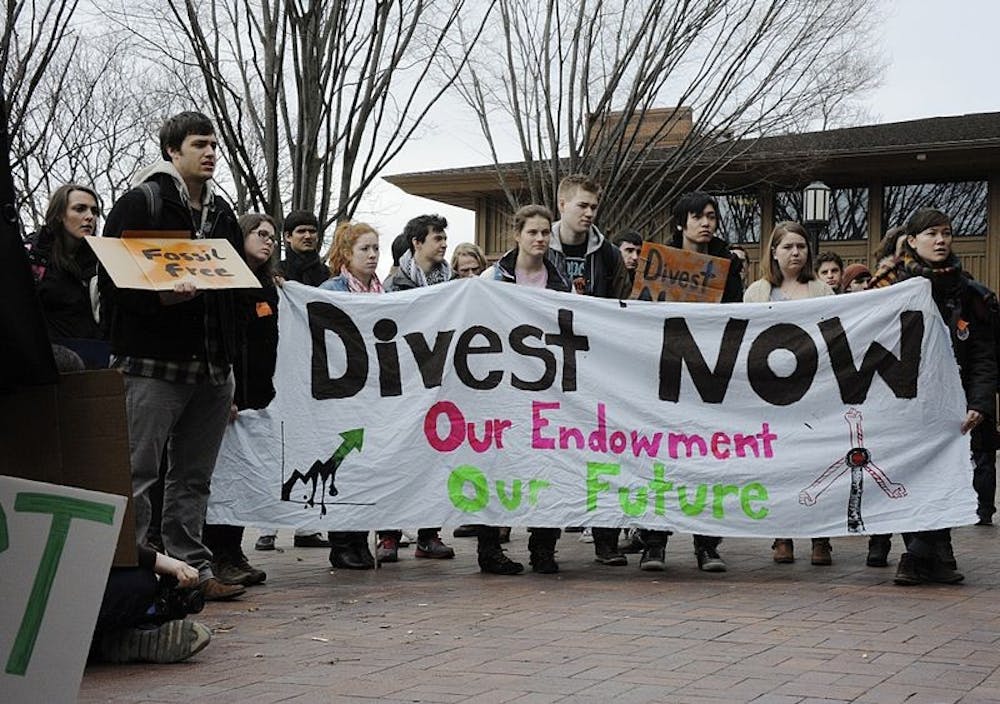by Alana Laanui |
The Bluff will soon see the growth of a campaign for the University’s divestment from fossil fuels. UP students Sara McDonagh and Anne Luijten were inspired to start a movement toward UP’s divestment through their Social Work for Sustainable Communities class. The class encouraged them to localize the larger problem of climate change by doing something to make a difference right here on campus.
Luijten, a senior sociology major, believes that the University should divest from fossil fuels because the movement aligns with UP’s sustainable ideals.
“Our University is so invested in sustainability, it has done so many things already to be sustainable,” Luijten said. “We think it is ironic that the University’s money is still supporting fossil fuel companies.”
Divestment occurs when institutions choose not to invest in the top 200 oil and gas companies (also known as the “Carbon Tracker 200”), which includes removing stocks, bonds or any other kind of financial investments.
The hope of the divestment movement, which has taken hold across the country in recent years, is to negatively stigmatize the oil and gas industry. It is seen as just one approach that can be taken to improve care for the planet.
Students from UP’s Social Work for Sustainable Communities class hope to get as many students as possible involved in their divestment campaign and plan on circulating a petition in the coming weeks. Through student support, they hope to influence faculty and staff and eventually urge administration to divest the University’s endowment.
“We want to get the University’s investments out of fossil fuels and get them into more renewable resources,” McDonagh said.
If UP were to divest, the University would be following in the footsteps of Multnomah County and the City of Portland, both of which made steps toward divestment from fossil fuels just weeks ago. Portland City Council agreed to put the top 200 coal, oil and gas companies on the “Do Not Buy” list. While the “Do Not Buy” list must be voted on annually, the movement demonstrates the city’s commitment to staying on track with the goal of being fully divested by 2018.
350PDX, a grassroots divestment program in Portland, along with students from Reed College who have participated in their own university’s campaign, talked with UP students about the issue last week. Sandy Polishuk, a divestment team coordinator for 350PDX, spoke about the importance of investing in the future by divesting in fossil fuels.
“It’s not just a negative, it’s also a positive,” Polishuk said. “We need to be putting money into renewables, sustainable organizations and things like that.”
Many universities in Portland, as well as throughout the nation, have recognized the importance of this movement. Students at Reed College started a movement a few years ago and continue to appeal to their Board of Trustees to divest. Two students from Reed, sophomore Maggie Davies and freshman Sara Gross, came to talk to UP students about how to start a campaign at UP and shared why they believe in divestment.
“It is counterintuitive to invest in something that destroys our environment,” Davies said. “Higher learning shouldn’t destroy our future.”
One obstacle to divestment that has been expressed by universities who are considering the change is the potential loss of money. Those top 200 companies that divestment targets are worth billions of dollars, and investors often fear that removing their funding will have negative repercussions.
Although divestment can be seen as risky, big institutions like Stanford University have chosen to divest. According to a press release from Stanford, they divested based on the belief that their decision will create a positive impact on the problem of climate change.
Other colleges including Georgetown University, University of California, University of Hawaii and University of Washington have also moved to divest from fossil fuels. Through student-led campaigns, petitions and demonstrations, students have changed the financial futures of their institutions.
Alana Laanui is a reporter for The Beacon. She can be reached at laanui18@up.edu or on Twitter @AlanaLaanui.








